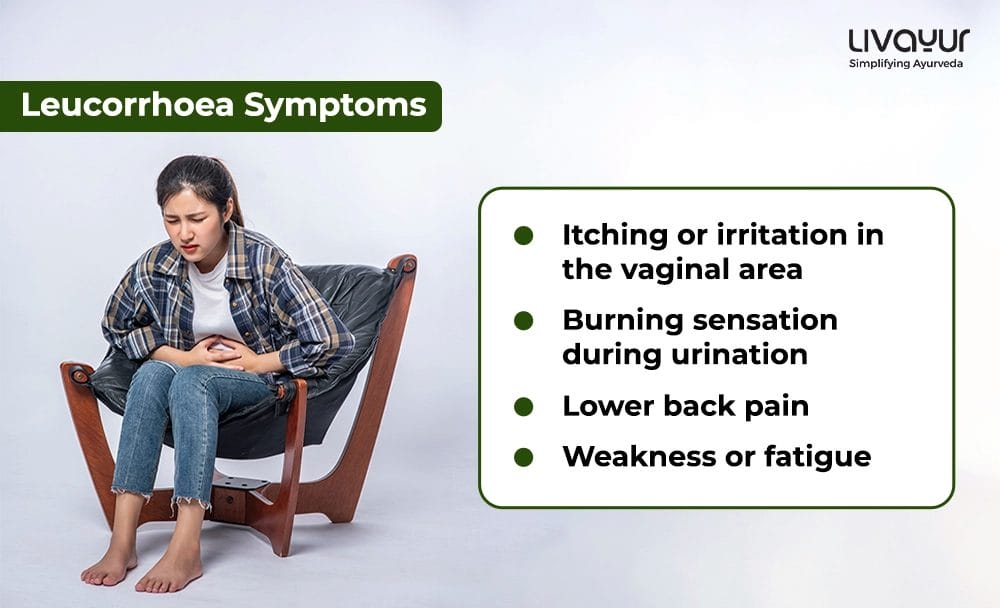
Leucorrhoea, also referred to as Sweta Pradara in Ayurvedic literature, is a common gynecological condition that affects many women worldwide. It refers to a thick, whitish, or yellowish vaginal discharge that may occur due to various reasons. While it is normal for women to have a certain amount of vaginal discharge, excessive or abnormal discharge can be a sign of an underlying issue. [1][2] In this article, we will explore the symptoms, causes, diagnosis, and Ayurvedic treatment options for leucorrhoea.
Symptoms of Leucorrhoea
The primary symptom of leucorrhoea is an abnormal vaginal discharge (Yonigata Shweta Strava). The discharge may be thick, sticky, and have a foul odor. It can vary in color from white to yellow or greenish. [3] [4] Other common symptoms include:
- Itching or irritation in the vaginal area (Yoni kandu)
- Redness and inflammation of the vulva
- Burning sensation during urination
- Lower back pain (Katishul) or abdominal discomfort
- Weakness or fatigue (Shrama)
Causes of Leucorrhoea [4] [5]
Several factors can contribute to the development of leucorrhoea. Some of the common causes include:
1. Infections
Bacterial, fungal, or parasitic infections such as yeast infections, bacterial vaginosis, or trichomoniasis can lead to abnormal vaginal discharge. This is one common cause of leucorrhoea.
2. Hormonal Imbalance
Fluctuations in hormone levels, particularly estrogen, can disrupt the natural balance of vaginal flora and result in leucorrhoea.
3. Poor Hygiene
Inadequate or improper hygiene practices can create an environment conducive to bacterial growth and vaginal infections.
4. Sexually Transmitted Infections (STIs)
STIs such as gonorrhea, chlamydia, or genital herpes can cause leucorrhoea as one of their symptoms.
5. Pelvic Inflammatory Disease (PID)
PID, usually caused by untreated or recurrent infections, can result in leucorrhoea along with pelvic pain and inflammation.
6. Kapha Dosha
Based on the clinical features of Vaginal Discharge (Shweta Pradara), it is identified as a Kaphaja disorder affecting the Apana Vayu region. Any type of discharge (Srava) is a result of an imbalance in the Kapha Dosha. Therefore, when Kapha becomes aggravated due to various factors, it leads to a white discharge through the vagina. This is primarily caused by the Drava (liquidity) property and Rasadushthi (vitiation of the bodily fluids) brought about by the imbalanced Kapha. [1] [2]
Diagnosis of Leucorrhoea [3] [4]
If you experience abnormal vaginal discharge or any associated symptoms, it is important to consult a healthcare professional for a proper diagnosis. During the diagnosis, the following steps may be involved:
1. Medical History
The doctor will inquire about your medical history, including any previous episodes of leucorrhoea or gynecological issues.
2. Physical Examination
A pelvic examination will be performed to check for any signs of infection, inflammation, or abnormal discharge.
3. Laboratory Tests
Vaginal swabs or samples may be collected to identify the underlying cause of leucorrhoea. These samples are analyzed in a laboratory for the presence of bacteria, fungi, or other pathogens.
Ayurvedic Treatment for Leucorrhoea
Ayurveda, the ancient Indian system of medicine, offers holistic approaches to treating various health conditions, including leucorrhoea. The leucorrhoea treatment in the realm of Ayurveda aims to balance the Doshas (energies) in the body and promote overall well-being. Here are some Ayurvedic treatments that can help manage leucorrhoea:
Oral Treatments
Ayurvedic literature prescribed several Oral Treatments for Sweta Pradara (Vaginal Discharge) based on the individual’s constitution and condition. Here are some of them:
- Pestled roots of Rohataka (Tecoma undulata) should be taken with water. [1]
- Darvyadi (Barberis aristata) decoction. [1]
- Paste or powder of Amalaki or seed of Amalaki (Emblica officinalis Gaertn.) should be taken with honey and sugar. [1]
- Paste of Lodhra (Symplocos racemosa Roxb.) should be taken with a decoction of stem bark of Nyagrodh(Ficus bengalensis L.) [1]
- Nagakeshar (Mesua ferreaL.) with Takra (buttermilk) followed by a diet of only cooked rice and Takra. [1]
External Ayurvedic Treatments
Ayurveda offers various external treatments that can help in the management of leucorrhoea. Yoni Pichu is one such procedure in which a cotton pad soaked in medicated oil is placed in the vagina for a specific duration. This helps in soothing the vaginal tissues, reducing discharge, and promoting healing. [6] Another procedure named Yoni Prakshalana, involves gentle cleansing of the vagina with medicated decoctions such as the stem bark of Lodhra (Symplocos racemosa Roxb.), and decoction of stem bark of Vata (Ficus bengalensis L.) is also an effective treatment for the condition. [1]
Ayurvedic Diet and Lifestyle

Following a healthy diet and lifestyle practices is crucial in managing leucorrhoea. Avoiding spicy, fried, and processed foods can help reduce inflammation and improve overall vaginal health. Regular exercise, adequate rest, and stress management techniques like yoga and meditation can also contribute to balancing hormones and strengthening the immune system.
Personal Hygiene
Maintaining proper personal hygiene is crucial for managing and preventing leucorrhoea. Regularly washing the genital area with mild, pH-balanced cleansers and avoiding the use of scented products or harsh soaps can help maintain the natural balance of vaginal flora.
Stress Management

Chronic stress can disrupt hormone levels and weaken the immune system, making the body more susceptible to infections. Practising stress management techniques, such as deep breathing exercises, and relaxation techniques, and engaging in activities that promote mental well-being, can aid in the treatment of leucorrhoea.
It is important to note that Ayurvedic treatments should be pursued under the guidance of a qualified Ayurvedic practitioner. They will assess your unique constitution and customize a treatment plan according to your needs.
Preventive Measures for Leucorrhoea
Prevention plays a crucial role in managing leucorrhoea and maintaining vaginal health. Here are some preventive measures that can be followed:
1. Maintain proper genital hygiene
Clean the genital area with mild, pH-balanced cleansers, and avoid douching or using harsh soaps.
2. Wear breathable underwear
Choose cotton underwear that allows proper air circulation to reduce moisture and promote vaginal health.
3. Avoid tight-fitting clothes
Wearing tight-fitting clothes can lead to increased moisture and decreased air circulation, creating an environment conducive to infections.
4. Practice safe sex
Use barrier methods of contraception, such as condoms, to prevent sexually transmitted infections that can lead to leucorrhoea.
5. Follow a healthy diet
Incorporate a balanced diet rich in fruits, vegetables, whole grains, and lean proteins to support overall health and strengthen the immune system.
Leucorrhoea: When to Seek Medical Help?
A woman needs to seek medical help without delay if she notices the following signs and symptoms:
- Foul-smelling discharge with a kind of fishy odor
- Greenish or yellowish discharge
- Large quantity of heavy discharge
- Chunky, cottage cheese-like discharge
- Frothy discharge
The above signs may indicate an infection, sexually transmitted diseases or something as serious as gynecological cancer. [7]
FAQs
1. Can leucorrhoea be a sign of an infection?
Yes, leucorrhoea can be caused by infections such as yeast infections (Candidiasis), bacterial vaginosis, or sexually transmitted infections (STIs) like trichomoniasis. It is important to consult a healthcare provider for an accurate diagnosis if an infection is suspected.
2. Can Ayurvedic treatment cure leucorrhoea?
Leucorrhoea Ayurvedic treatment can help manage and alleviate the leucorrhoea symptoms by addressing the underlying imbalances in the body. However, the effectiveness of the treatment may vary depending on the individual and the severity of the condition. It is recommended to consult a qualified Ayurvedic practitioner for personalized treatment.
3. Can leucorrhoea recur after treatment?
Leucorrhoea can recur if the underlying causes are not addressed properly. It is important to follow the treatment plan recommended by a healthcare provider and make necessary lifestyle changes to minimize the chances of recurrence.
4. Can Ayurvedic treatment for leucorrhoea be used during pregnancy?
Pregnant women should exercise caution when considering any treatment, including Ayurvedic remedies. It is crucial to consult with a qualified healthcare provider before starting any treatment during pregnancy to ensure the safety of both the mother and the developing baby.
5. How long does Ayurvedic treatment for leucorrhoea take to show results?
The duration of leucorrhoea treatment in Ayurveda may vary depending on individual factors, such as the severity of the condition, overall health, and adherence to the treatment plan. It is important to follow the recommended treatment protocol consistently and be patient, as the healing process takes time.
Conclusion
Leucorrhoea is a common condition that can cause discomfort and concern among women. Understanding leucorrhoea symptoms, causes, and diagnostic methods is essential for timely intervention and appropriate leucorrhoea treatment. Ayurveda offers a holistic approach to managing leucorrhoea by addressing the root cause and promoting overall well-being. By incorporating leucorrhoea Ayurvedic treatment, following preventive measures, and maintaining good personal hygiene, women can effectively manage leucorrhoea and improve their vaginal health. However, it is always advisable to consult with a healthcare professional or an Ayurvedic practitioner for an accurate diagnosis and personalized treatment plan.
Disclaimer
This article is for informative purposes only and does not constitute medical advice. Kindly contact a medical professional before attempting any treatments mentioned in the article yourself.
References
- View of Ayurvedic Concept Of Leucorrhoea: Sweta Pradara (ijapr.in)
- Management of Shweta Pradara (Leucorrhoea) Through Ayurveda- A Case Series | International Journal of Ayurveda and Pharma Research (ijapr.in)
- Vaginal discharge (researchgate.net)
- Clinical Review: Vaginal discharge – PMC (nih.gov)
- ABC of sexually transmitted infections: Vaginal discharge—causes, diagnosis, and treatment – PMC (nih.gov)
- View of Clinical efficacy of Karanj Tail Yoni Pichu in the management of Shwetapradar w.s.r. to Leucorrhoea | Journal of Ayurveda and Integrated Medical Sciences (jaims.in)
- Copious vaginal discharge finally diagnosed as cervical adenocarcinoma: A case report
















